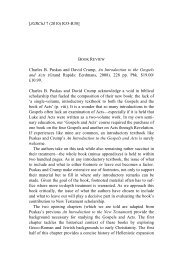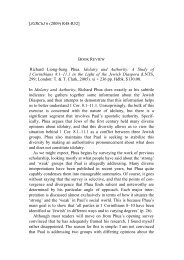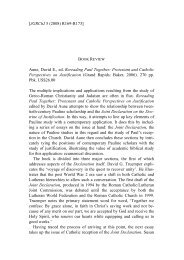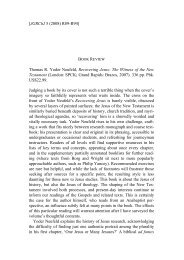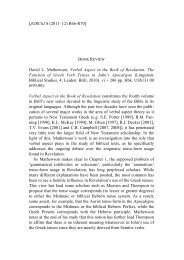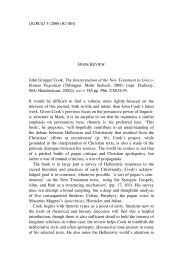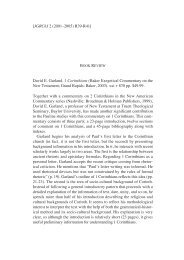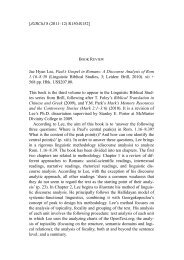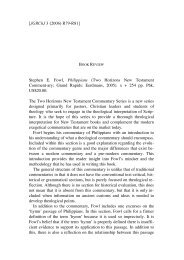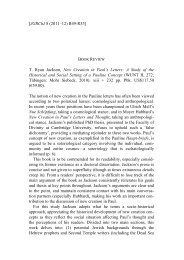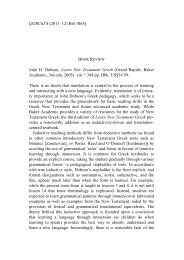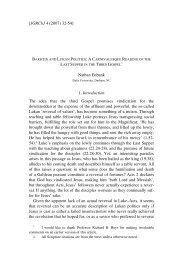The Politics of Ephesians and the Empire - Journal of Greco-Roman ...
The Politics of Ephesians and the Empire - Journal of Greco-Roman ...
The Politics of Ephesians and the Empire - Journal of Greco-Roman ...
Create successful ePaper yourself
Turn your PDF publications into a flip-book with our unique Google optimized e-Paper software.
Gupta & Long <strong>Politics</strong> <strong>of</strong> <strong>Ephesians</strong> <strong>and</strong> <strong>the</strong> <strong>Empire</strong> 121<br />
In Mediterranean society, this age was under <strong>the</strong> particular guidance <strong>and</strong><br />
influence <strong>of</strong> <strong>the</strong> <strong>Roman</strong> Emperor who is described as ‘<strong>the</strong> ruler’ (at <strong>the</strong><br />
time <strong>of</strong> writing, Nero). <strong>Roman</strong> rulers were under <strong>the</strong> jurisdiction <strong>of</strong> <strong>the</strong><br />
patron god <strong>of</strong> Rome, Jupiter-Zeus, a god identified with ‘air’ <strong>and</strong> as having<br />
authority over that domain. Moreover, beginning with Augustus, emperors<br />
were at times publically characterized as Jupiter-Zeus as Triumphator in<br />
association with Jupiter Capitolinus, if not even perpetually in statuary in<br />
temples (e.g. Caesarea Maritima) or on coinage or jewelry (e.g. Gemma<br />
Augusta).<br />
To summarize Long’s evidence, several considerations must be held<br />
toge<strong>the</strong>r. First, ‘ruler’ in <strong>the</strong> Pauline letters <strong>and</strong> Acts refers to human rulers<br />
(see esp. 1 Cor. 2.6, 8; Rom. 13.3). 32 Paul urges Christians to submit to<br />
<strong>the</strong>se rulers as ‘higher authorities’ (e0cousi/aij u9perexou/saij) <strong>and</strong> as<br />
those to whom God has appointed e0cousi/a ‘authority’ (Rom. 13.1-3).<br />
<strong>The</strong>y are described as rulers <strong>of</strong> ‘this age’ (tou= ai0w~noj tou/tou) (1 Cor.<br />
2.6, 8), who have a ‘human wisdom <strong>of</strong> this age’ (tou= ai0w~noj tou/tou)<br />
(1 Cor. 2.6, 13) in relation to ‘<strong>the</strong> spirit <strong>of</strong> <strong>the</strong> world’ (ko/smoj) (1 Cor.<br />
2.12). One sees, <strong>the</strong>n, that in Paul’s construct <strong>of</strong> political governance,<br />
he speaks <strong>of</strong> human rulers <strong>and</strong> authority <strong>of</strong> this age, related to <strong>the</strong> spirit<br />
<strong>of</strong> <strong>the</strong> world. Interpreters must consider <strong>the</strong> tension that exists between<br />
1 Corinthians <strong>and</strong> <strong>Roman</strong>s; in consequence, some interpreters have<br />
recently attempted to see in <strong>Roman</strong>s an anti-<strong>Roman</strong> sentiment. 33 Also<br />
in tension with <strong>Roman</strong>s 13 is Eph. 2.1-2, which effectively critiques<br />
<strong>and</strong> demonizes Rome’s emperor as a negative example <strong>of</strong> how to live in<br />
this age; believers should not imitate him, but ra<strong>the</strong>r God in Jesus Christ<br />
(4.32–5.2).<br />
Secondly, <strong>the</strong>re are numerous ancient references that identify Jupiter-<br />
Zeus as ‘air’ or ‘having authority over <strong>the</strong> air’. He is associated with<br />
32. See <strong>the</strong> excellent treatment by Gordon D. Fee, New Testament Exegesis:<br />
A H<strong>and</strong>book for Students <strong>and</strong> Pastors (Louisville, KY: Westminster/John Knox,<br />
3rd edn, 2002), pp. 84-93. When one exp<strong>and</strong>s to <strong>the</strong> broader Jewish world in <strong>the</strong><br />
first century, virtually <strong>the</strong> same results are seen. After Wink’s study <strong>of</strong> a1rxwn, he<br />
concludes: ‘Apart from four passages in Philo, in <strong>the</strong> LXX, Philo, <strong>and</strong> Josephus,<br />
archōn is used exclusively for an incumbent-in-<strong>of</strong>fice <strong>and</strong>, with sole exception <strong>of</strong><br />
Daniel 10 <strong>and</strong> 12, for human agents’ (Naming <strong>the</strong> Powers: <strong>The</strong> Language <strong>of</strong> Power<br />
in <strong>the</strong> New Testament [Philadelphia: Fortress Press, 1984], p. 13). Josephus, Ant.<br />
19.261, uses a1rxwn <strong>of</strong> <strong>the</strong> emperor Claudius, <strong>and</strong> Plutarch, Galb. 4.4, uses a1rxwn<br />
for <strong>the</strong> ultimate position <strong>of</strong> Rome embodied in <strong>the</strong> emperor.<br />
33. See especially Neil Elliott, ‘<strong>Roman</strong>s 13:1-7 in <strong>the</strong> Context <strong>of</strong> Imperial<br />
Propag<strong>and</strong>a’, in Horsley (ed.), Paul <strong>and</strong> <strong>Empire</strong>, pp. 184-204.



